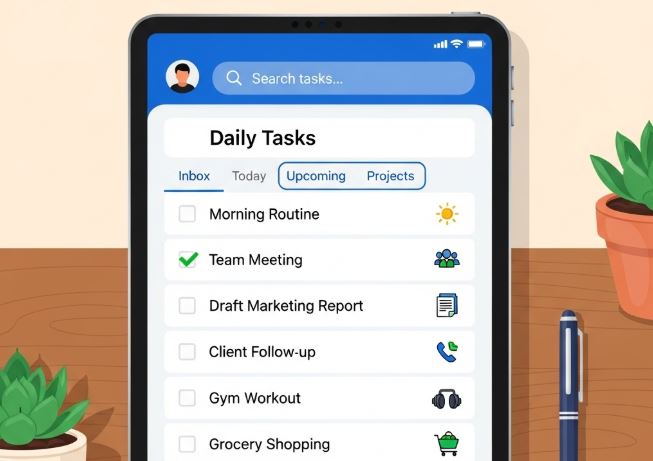Is Task Management Still Helpful to Business?

The Differences Between Personal and Business Messaging Apps
2 September, 2025
Đổi mới đánh giá cán bộ, công chức, viên chức: Nâng cao hiệu quả và chất lượng đội ngũ
2 September, 2025Last updated on 16 September, 2025
In today’s fast-paced business environment, staying organized and efficient is more critical than ever. Task management, the process of planning, organizing, and tracking tasks to achieve specific goals, remains a cornerstone of productivity. But with the rise of automation, AI tools, and evolving workplace dynamics, some may wonder: Is task management still helpful to businesses? The answer is a resounding yes. This article explores why tasks management continues to be a vital practice for businesses of all sizes, backed by its benefits, modern applications, and adaptability to current trends.
Why Task Management Matters in Business
Task management is the backbone of operational efficiency. It ensures that teams stay aligned, deadlines are met, and resources are utilized effectively. Here are the key reasons why tasks management remains indispensable:
Enhances Productivity and Efficiency
Task management provides clarity by breaking down complex projects into manageable tasks. By assigning priorities, deadlines, and responsibilities, businesses can avoid wasted time and ensure employees focus on high-impact activities. A 2023 study by the Project Management Institute found that organizations with effective tasks management systems reported a 28% increase in productivity compared to those without structured processes.
Improves Team Collaboration
Modern task management tools, such as Trello, Asana, or Monday.com, iNexx enable seamless collaboration. Teams can share updates, track progress, and communicate in real time, reducing miscommunication and fostering accountability. For remote and hybrid teams, these tools bridge geographical gaps, ensuring everyone stays on the same page.
Reduces Stress and Burnout
Unorganized workflows can lead to missed deadlines, overlapping responsibilities, and employee burnout. Task management systems provide visibility into workloads, helping managers distribute tasks evenly and prevent overburdening team members. According to a 2024 survey by Gallup, companies that prioritize workload management see a 15% reduction in employee stress levels.
Adapts to Modern Business Needs
The rise of AI and automation has not diminished the value of tasks management; instead, it has enhanced it. Tools now integrate with AI to automate repetitive tasks, provide predictive analytics for better planning, and offer insights into team performance. For example, platforms like ClickUp use AI to suggest task prioritization based on deadlines and resource availability.
How Task Management Evolves with Business Trends
The business landscape is constantly evolving, and tasks management has adapted to meet these changes. Here’s how it remains relevant:
Supporting Remote and Hybrid Work
With remote work becoming a norm, tasks management tools have become essential for coordinating distributed teams. Features like cloud-based access, real-time updates, and integrations with communication platforms (e.g., Slack, Microsoft Teams) ensure that remote employees remain productive and connected.
Integration with AI and Automation
AI-powered task management tools can analyze data to optimize workflows, predict project bottlenecks, and automate routine tasks. This allows businesses to focus on strategic decision-making while routine operations run smoothly. For instance, tools like Jira use machine learning to forecast project timelines based on historical data.
Agile and Flexible Methodologies
Task management aligns perfectly with agile methodologies like Scrum and Kanban, which emphasize iterative progress and adaptability. Businesses adopting these frameworks rely on tasks management to break projects into sprints, track progress, and pivot quickly when needed.
Common Challenges and How to Overcome Them
While task management is highly beneficial, it’s not without challenges. Here are some common pitfalls and solutions:
- Overcomplication: Overly complex tools can overwhelm teams. Solution: Choose user-friendly platforms and provide training to ensure adoption.
- Lack of Buy-In: Employees may resist using new systems. Solution: Demonstrate the benefits of tasks management, such as reduced workload stress, and involve teams in selecting tools.
- Poor Prioritization: Focusing on low-value tasks can derail projects. Solution: Use frameworks like Eisenhower Matrix or OKRs (Objectives and Key Results) to prioritize effectively.
Choosing the Right Task Management Tools
Selecting the right tool is critical to maximizing the benefits of task management. Here are some popular options and their strengths:
- Trello: Ideal for small teams and visual learners, using Kanban boards for task tracking.
- Asana: Best for complex projects, offering robust features for task dependencies and timelines.
- Monday.com: Highly customizable, suitable for businesses of all sizes with extensive integrations.
- ClickUp: Offers AI-driven insights and is budget-friendly for startups.
- iNexxus: A user-friendly UI/UX task management and collaboration platform offering features like chat, notifications, and project management, tailored to suit a diverse range of businesses.
When choosing a tool, consider your team’s size, budget, and specific needs. Many platforms offer free tiers, making it easy to test before committing.
The Future of Task Management in Business
As businesses continue to navigate digital transformation, tasks management will evolve further. Emerging trends include:
- Increased AI Integration: AI will play a larger role in automating task assignments and predicting project outcomes.
- Personalized Workflows: Tools will offer more customization to align with unique business processes.
- Focus on Employee Well-Being: Task management systems will incorporate features to monitor workloads and prevent burnout.
Conclusion
Task manager is not just helpful—it’s essential for businesses aiming to thrive in a competitive landscape. By improving productivity, fostering collaboration, and adapting to modern trends, tasks management ensures that businesses stay organized and agile. Whether you’re a small startup or a global enterprise, investing in effective tasks management practices and tools will drive success. Start leveraging task management today to streamline operations and empower your team.
Ready to boost your business efficiency? Explore task management tools and find the perfect fit for your team’s needs.
Further Readings
Benefits of Using KPI Software in Performance Management
7 Best Project Management Tools in 2025
Why Business Chat Apps Are Essential for Companies
How Project Management Software Help Improve Productivity in Businesses
7 Best KPI Software for Managing Business Performance in 2025




